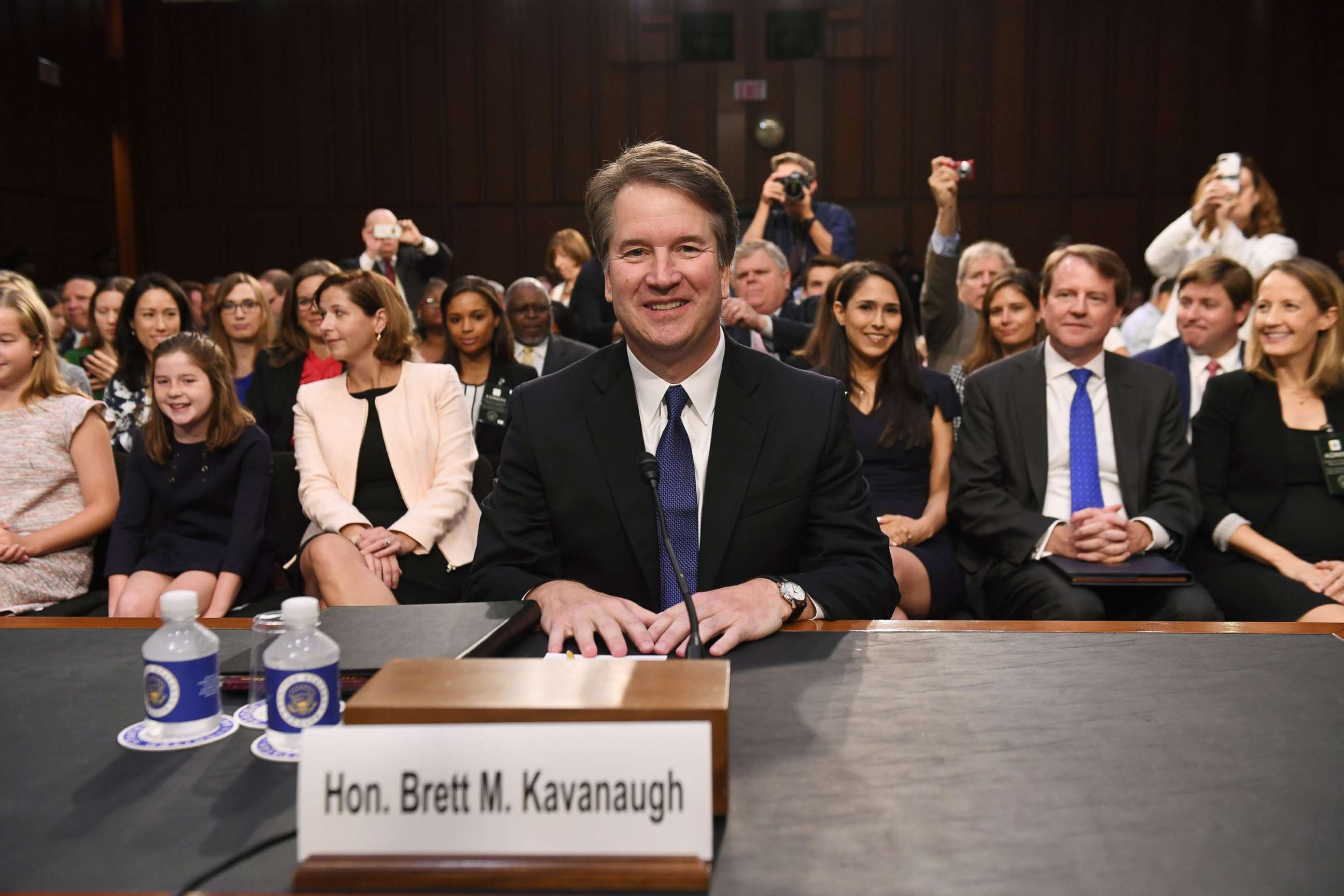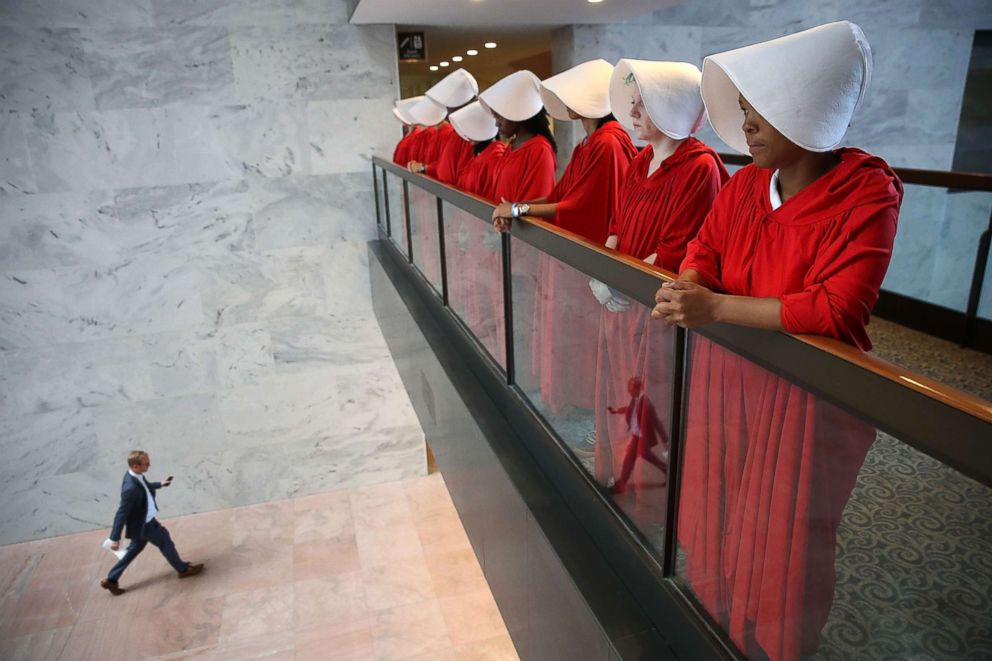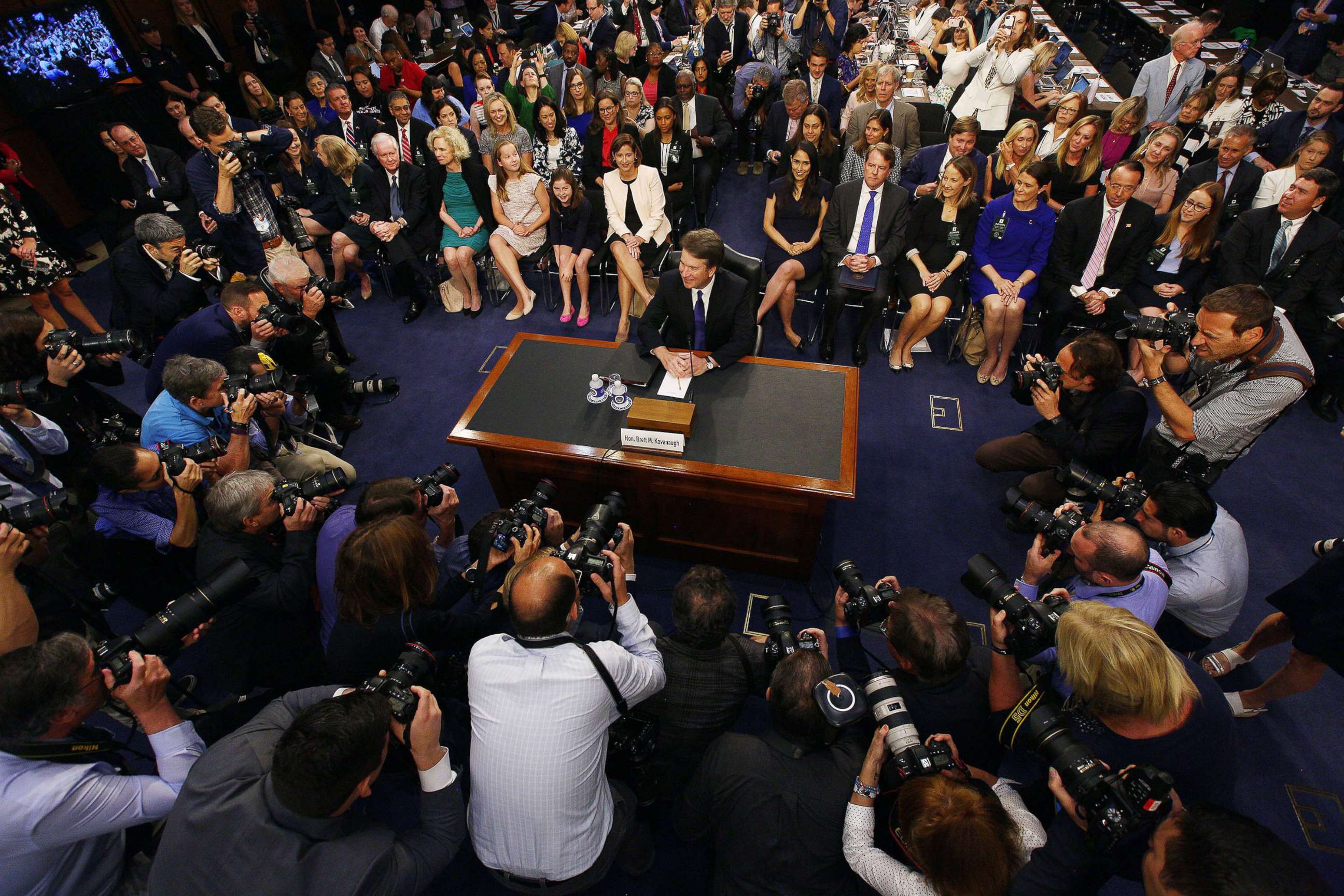Brett Kavanaugh says a 'good judge' must be an 'umpire' in first day of confirmation hearing
Democrats objected to a last-minute document release.
Confirmation hearings for Supreme Court nominee Brett Kavanaugh began with protests Tuesday, as Democrats objected to what they say is a lack of critical information about the judge's record and demanded the proceedings be delayed.
After some eight hours of senators sparring, the Judiciary Committee finally heard from Kavanaugh himself late Tuesday afternoon, shortly before the hearing ended for the day.
In his opening statement, Kavanaugh outlined his approach to hearing cases, saying that judges should be an "umpire, a neutral and impartial arbiter" and deal in real cases, not abstract theories.
He said he doesn't decide cases based on his personal political views.
"My judicial philosophy is straightforward. A judge must be independent and must interpret the law, not make the law. A judge must interpret statutes as written. A judge must interpret the Constitution as written, informed by history and tradition and precedent," he said.
He called retired Justice Anthony Kennedy, for whom he once clerked and would replace on the court, "a mentor, friend and hero."
He appeared to get emotional at one point while saying he was "grateful for my friends."
"This past May, I delivered the commencement address at Catholic University Law School," he continued. "I gave the graduates this advice: Cherish your friends. Look out for your friends. Lift up your friends. Love your friends."
When questioning begins Wednesday, senators are expected to push Kavanaugh on various issues throughout the week including abortion, executive authority, and the Second Amendment.
While Democrats protested not being given what they said was important information from Kavanaugh's background and claimed he would be a politically motivated judge, Republicans said the Supreme Court should be de-politicized. Sen. Lindsey Graham, a South Carolina Republican, called Tuesday the "hypocrisy hearing" and called out Democrats for focusing on Kavanaugh's political views and not his qualifications.
"People see through this. You had a chance and you lost. If you want to pick judges from your way of thinking you better win an election," Graham said.
Throughout the day on Tuesday, Democrats continued to protest that they haven't been given all the documents they requested related to Kavanaugh's work at the White House under President George W. Bush. The Trump White House withheld some 100,000 pages of documents, citing executive privilege, but Democrats have accused the Republican majority of refusing to release other documents publicly.

Members of the committee also said they want Kavanaugh to address the president's attacks against the Justice Department and Attorney General Jeff Sessions and to explain how his view of executive power could affect any votes he might cast in cases involving investigations surrounding President Trump.
More than an hour after Grassley gaveled in the hearing and with protesters shouting in the background, Democrats objected, saying that a release of additional documents late Monday night did not give them enough time to properly vet the information.
Senators on both sides of the aisle said they would be asking Kavanaugh for his views on executive power.
Sen. Ben Sasse, a Nebraska Republican, said the Supreme Court has become a "substitute political battleground."
"Ultimately because people can't navigate their way through the bureaucracy, they turn to the Supreme Court," he added. "We look for nine justices to try to right the wrongs from other places in the process," he continued.
In multiple decisions about policies, such as an EPA rule intended to fight climate change, Kavanaugh has written that agencies can issue regulations only when authorized by Congress.
"The solution here is not to try to find judges who will be policymakers," Sasse said. "The solution is not to try to turn the Supreme Court into an election battle for TV. The solution is to restore to a proper constitutional order with the balance of powers. We need Schoolhouse Rock back, and we need a Congress that writes the laws and then stands before the people, and suffers the consequences," he said in his opening statement.
Kavanaugh seemed to agree, saying "the Supreme Court is not a partisan institution.
"The Justices on the Supreme Court do not sit on opposite sides of an aisle. They do not caucus in separate rooms. If confirmed to the Court, I would be part of a Team of Nine, committed to deciding cases according to the Constitution and laws of the United States. I would always strive to be a team player on the Team of Nine," he said in his opening statement.
But Democrats said that President Trump's attitude toward the judicial branch is cause for even more concern.
"You are the nominee of President Donald John Trump. This is a president who's shown us consistently he's contemptuous of the rule of law. He's said and done things as president which we've never seen before in history, Sen. Dick Durbin, an Illinois Democrat, said. "He dismissed the head of the FBI when he wouldn't bend to his will. He harasses his attorney general on almost a daily basis in the exercise of his office, and I didn't vote for Jeff Sessions, but I have to tell you there should be some respect at least for the office he serves in. And it's that president who's decided you are his man. You're the person he wants on the Supreme Court. You are his personal choice. So are people nervous about this? Are they concerned about it? Of course they are," Durbin said.
Sen. John Kennedy, R-La., echoed Sasse's point that judges should interpret the law but not make decisions based on their personal opinions.
"The role of the judge is or at least should be to say what the law is. Not what the law ought to be. Now it has become cliche, but cliches become cliches, because ey are true. Judges are not put there to try to bypass the ballot. Courts should not try to fix problems that are within the province of the United States Congress, even if the United States Congress doesn't have the courage to address those problems," Sen. John Kennedy, R-La., said.
Multiple senators brought up Trump's tweet over the weekend where he questioned the Justice Department over charges against two Republican members of Congress.
"Jeff sessions has resisted pressure from the president to punish his enemies and relieve pressure on his friends. And many of the questions that you will get on the other side of the aisle and from me will be how you view that relationship. Where you believe that the article I powers end and article II powers of the administration begin. So I expect to have a number of questions on that subject," Sen. Jeff Flake, R-Ariz., said.
"You are nominated by that very president who has launched this attack the on our department of justice, on the rule of law, on law enforcement like the FBI law enforcement at every level whose integrity he has questioned and your responses to these questions will be highly enlightening about whether you join us in defending the judiciary and the rule of law.," Sen. Richard Blumenthal, D-Conn., said.
And Sen. Amy Klobuchar, D-Minn., said she is especially concerned that Trump nominated a judge that has written that a president should not be subject to investigation while in office or can disregard a law he or she sees as unconstitutional.
"There were many highly credentials nominees like yourself that could have been sitting before us today. But to my colleagues, what concerns me is that during this critical juncture in history, the president has handpicked a nominee to court with the most expansive view of presidential power possible. A nominee who has actually written that the president on his own can declare laws unconstitutional," she said.
In her opening statement, the top Democrat on the committee, Dianne Feinstein of California, raised concerns about Kavanaugh's dissent in a recent case from his time on the D.C. Circuit Court of Appeals. The issue was whether an undocumented minor in U.S. custody would be allowed to get an abortion. She said his dissent in the case, in which he argued it was not too much of a burden for the young woman to wait to have the abortion until she was moved from the detention facility to stay with a sponsor, mischaracterized Supreme Court precedent on abortion.
"The argument rewrites Supreme Court precedent and, if adopted, we believe, would require courts to determine whether a young woman had a sufficient support network when making her decision, even in cases where she has gone to court. This reason we believe, I believe, demonstrates that you are willing to disregard precedent, and if that's the case, because just saying something's settled law, is it really correct law?" Feinstein said.
Before the hearing began, Democrats said they were going to the hearings "under protest" as the Trump White House claimed executive privilege in withholding documents from Kavanaugh's time working at the White House under President George W. Bush.
"Democrats strongly object to moving forward when so much of his record remains secret. We are shocked at the efforts being taken to jam this nominee through and hide his record from the American public. We go to these hearings under protest," ranking member Feinstein said at a news conference Tuesday morning.

After protesters in the audience were removed and the room quieted down, Kavanaugh said, "I am honored to be here today" and introduced his family.
Protesters continued to interrupt as committee members delivered their opening statements and late Tuesday U.S. Capitol Police said 61 individuals had been removed from the hearing room.
At one point, Sen. Orrin Hatch, R-Utah, asked for a "loudmouth" protester to be removed while he spoke and said the committee shouldn't have to "put up with this kind of nonsense."
Grassley pushed back against the Democrats, saying that it is appropriate to withhold some of the documents from Kavanaugh's time at the White House because he was a senior lawyer whose advice to the president on issues should remain confidential. He said the committee has received 307 of Kavanaugh's written opinions, more than 10,000 pages of his writings, 17,000 pages of speeches, articles and other documents, and 483,000 pages of documents from his work at the White House.
"This committee has more materials for Judge Kavanaugh's nomination than we have had on any Supreme Court nominee in history. Senators have had more than enough time and materials to adequately assess Judge Kavanaugh's qualifications and so that's why I proceed," Grassley said.

Sen. Patrick Leahy, a Vermont Democrat, said the Senate is not being the "conscience of the nation" and is not living up to the responsibility to vet Supreme Court nominees by holding a hearing before senators have seen 100 percent of documents related to Kavanaugh's past work.
He called the hearing "a sham."
"Judge Kavanaugh there is (sic) so many things wrong with this committee's vetting of your record, it's hard to know where to begin. I've been on this committee on both Republican and Democratic leadership. I never thought the committee would sink to this. In fact, you shouldn't be sitting in front of us today. You should be sitting in front of us only after we've completed a review of your record, your vetting is less than 10 percent complete. In critical ways our committee is abandoning its tradition of exhaustively vetting supreme court nominees," Leahy said.
Grassley said it was misleading to argue that the committee did not have enough information to evaluate Kavanaugh's record because senators have more documents than made available for any other Supreme Court nominee, but Democrats argue that it still isn't the full picture.
Earlier, Grassley denied a vote on a motion from Sen. Richard Blumenthal, D-Conn., to adjourn the hearing, saying that the Democrats are out of order and it was not appropriate to bring up the motion during an open hearing. In his opening statement, Durbin asked Kavanaugh to ask for the hearings to be suspended until Democrats could review his complete record.
As Democrats pressed their objections, Sen. John Cornyn, the committee's second-ranking Republican, said this was the first Supreme Court confirmation hearing held "according to mob rule."
Sen. Ted Cruz, R-Texas, also pointed out that all the Democrats on the committee have already publicly said they will vote against Kavanaugh and that Democrats are just trying to create a distraction because Kavanaugh is unquestionably qualified.
"There is an old saying for trial lawyers. If you have the fax, pound the facts. If you have the law, pound the law. If you have neither, pound the table. We are seeing a lot of table-pounding this morning. The Democrats are focused on procedural issues because they don't have substantive points strong enough to derail this nomination and substantive criticism with Judge Kavanaugh's actual record so they are trying to divert everyone with procedural issues," he said.
ABC News' Megan Hughes and Trish Turner contributed to this report.




